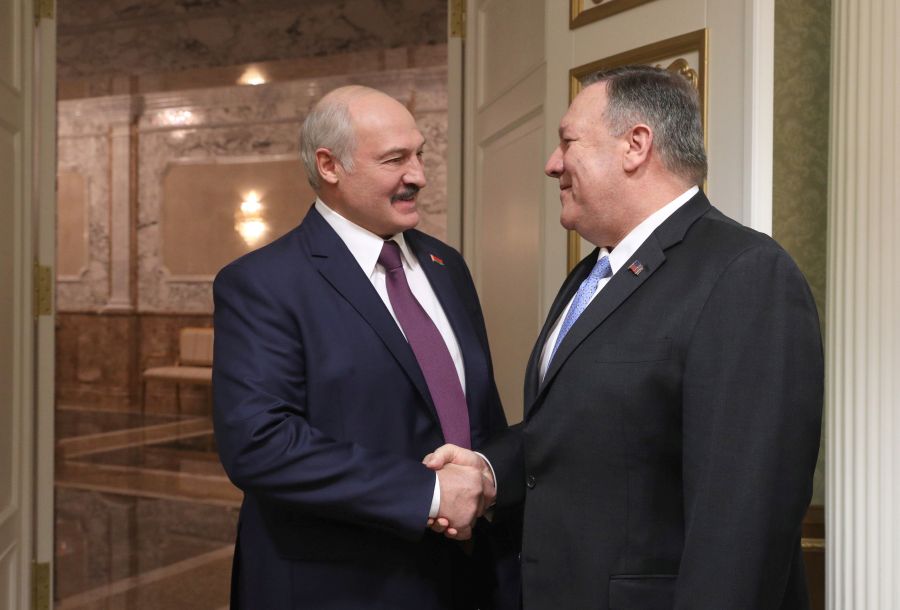On 1 February 2020, President Alexander Lukashenka, President of Belarus for 25+ years and the longest-serving president in Europe, met with US Secretary of State Mike Pompeo in Minsk. This occasion marked the first time since 1994 that the US Secretary of State has visited Belarus.
There was a bit of irony in Lukashenka´s welcome greeting and saying that Pompeo had taken a risk to come to look at Belarus after all kinds of “absolutely baseless misunderstandings” in relations between the two countries. But the US´s top diplomat did not take any risks at the meeting with the “last dictator of Europe,” a nickname given to Lukashenka that even he sometimes uses to refer to himself. Pompeo made no big promises and did not even hint publicly at the possibility for lifting the sanctions imposed on Belarus in 2008.
Pompeo instead confirmed the US’s willingness to help Belarus build its own sovereign country, as well as the readiness of US oil companies to supply Minsk with 100% of the oil it needs at competitive prices. “All you need to do is tell us and contact us,” said the US Secretary of State.
As is well known, the contracts for the supply of Russian oil to Belarus ended on 31 December 2019. A new agreement has been delayed due to disagreements on the price of supplies and transportation. Moscow is ready to offer better prices only if Minsk takes concrete steps towards a state of union between Russia and Belarus. Consequently, Lukashenka is now talking about the need and readiness for Belarus to diversify its oil import suppliers.
Pompeo´s message in short: The choice is yours. If you show interest, the US is ready. But at the same time, the US Secretary of State also stressed that there is no need for Belarus to take sides between the US and Russia.
Many more risks were taken by Lukashenka himself that could impact his relations with Moscow. Noteworthy was Lukashenka´s main message to Pompeo during the first few minutes of the meeting while the press was still present. Here he highlighted the successful cooperation and joint actions between the US and Belarusian special services.
Security issues are now high on the agenda in Belarus. Just two weeks ago President Lukashenka shuffled three of the most senior military positions in the country. On January 30 the new commanders ordered snap exercises for the Belarusian army to check combat readiness “to fulfil their mission in a rapidly changing environment.”
Pompeo’s visit was a signal to both Belarus and Moscow. The coming months will show the extent Minsk will use its warming relationship with the West to reform its economy and to strengthen its sovereignty. Alternately, Lukashenka could also be using this appearance of goodwill to simply to negotiate for better economic and financial contracts with Moscow – as he often has done in the past. However, some current steps have been bolder than before.
The inefficient economic model built up under Lukashenka´s regime is able to exist only with Moscow´s support through guaranteed and unrestricted access to the Russian market and favourable energy prices. With its current economic model, Belarus cannot make a sharp turn away from Russia – that much is clear.
The West is waiting for small but concrete steps from Belarus. Vladimir Makei, Minister of Foreign Affairs, acknowledged that Belarus recognized the necessity of making changes. “Belarus is probably not the most ideal country in this regard, and we do understand that we must implement some reforms in many areas, including the area of human rights – and we are doing this,” he said.
The Kremlin´s reactions have so far been restrained. Public pressure on Lukashenka would be counterproductive. There are tens of other tools to influence Belarus. It is very likely that the historical files on Lukashenka’s activities regarding the suppression of the opposition and the disappearance of journalists and civil activists will be leaked soon.
It is also important for Belarus that Pompeo was warmly welcomed to Kazakhstan and Uzbekistan after. Minsk is not alone vis-a-vis with Moscow.
Pompeo’s visit to Minsk is also an encouraging signal for Europe. Belarus is in Europe and geographically-speaking, even in the centre of the continent. Belarus has a common border and a common history not only with Russia but also with Lithuania, Poland, Ukraine and Latvia. These immediate neighbouring countries’ attitude to the Kremlin’s ideology is, to say the least, alternative. Therefore, Pompeo’s Baltic colleague, Foreign Minister of Lithuania Linas Linkevicius’ recent visit to Belarus has high significance as well.


